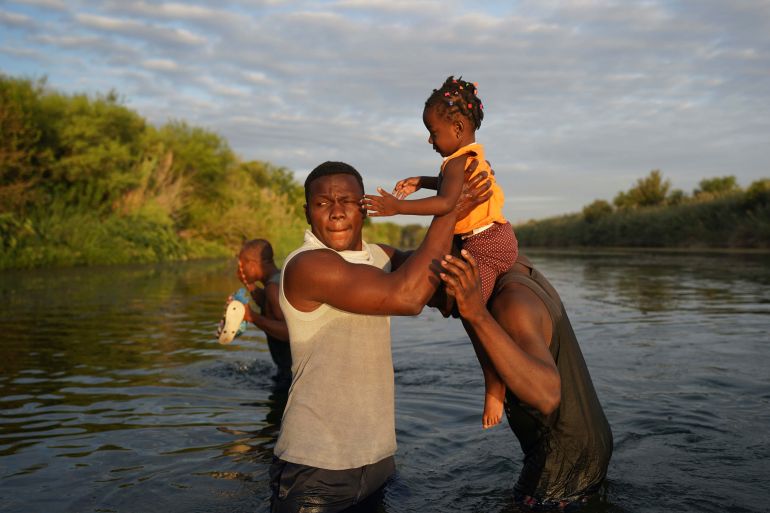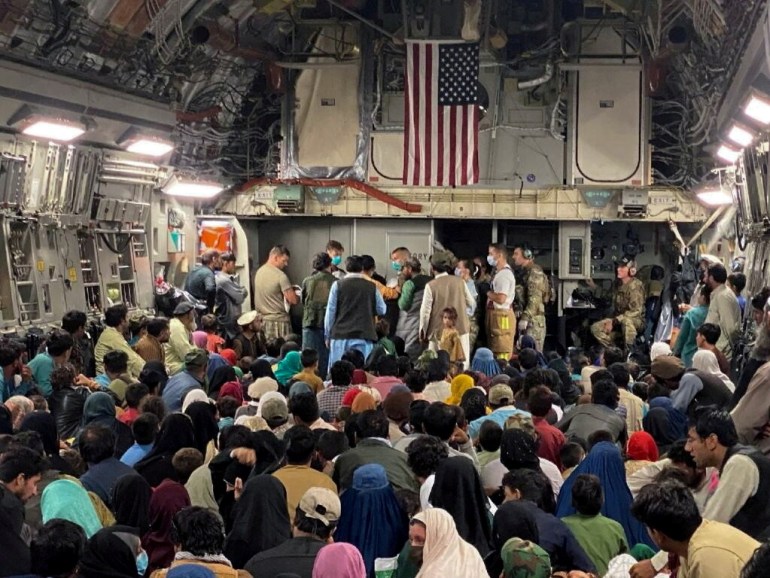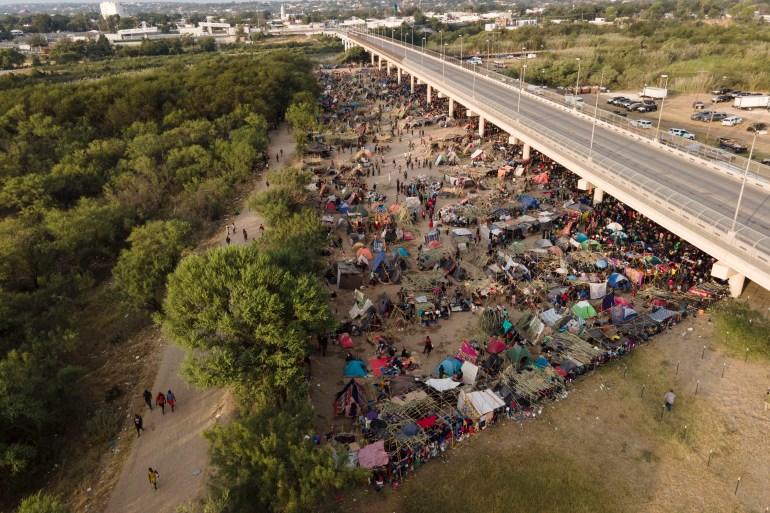Biden faces harsh criticism for expelling Haitian asylum seekers
US plan to expel most of the more than 14,000 Haitian migrants camped at Mexico border has been widely condemned.

Washington, DC – Images of United States border agents in cowboy hats snapping reins like whips atop horses as they try to push Haitian migrants back across the Rio Grande River into Mexico drew widespread condemnation this week.
They also heaped mounting pressure on President Joe Biden to account for – and reverse – his administration’s plan to expel the majority of the more than 14,000 Haitians who have been camped under a bridge in southern Texas in hopes of getting asylum in the US.
Keep reading
list of 3 itemsIn Pictures: US begins to deport Haitian migrants camped in Texas
Mass expulsion of Haitian migrants from Texas continues
Immigration advocates and international experts have said the country’s “obscene” expulsion policy and its treatment of the Haitian asylum seekers may be a violation of international law, while the US special envoy to Haiti resigned over what he called the “inhumane” decision to deport them.
But advocates also noted that the scenes at the southern border were starkly different to the welcome that thousands of Afghan refugees received in the US just weeks ago, fuelling more criticism of the Biden administration’s immigration policies.
“When you contrast the welcome mat that was rolled out for many Afghan refugees who are deserving – of course – of our support and resettlement, with the deplorable treatment of Black migrants on our own soil, it is just an unfathomable contrast,” said Nicole Melaku, executive director of the National Partnership for New Americans, an immigrant advocacy organisation.

‘Unique situation’
Americans from across the political spectrum have mobilised in recent weeks to welcome Afghans who were evacuated amid the hurried withdrawal of US troops from Afghanistan in late August as the country fell under the control of the Taliban.
Food and clothing drives were organised as US officials launched a nationwide effort to help Afghans resettle in the country with the help of three former US presidents and more than 250 private businesses.
Experts said that most Americans are united around resettling Afghan refugees because they are perceived as loyal to the US, and Americans feel a sense of moral obligation towards them – a feeling that does not necessarily extend to people from other parts of the world.
The US has so far admitted 37,000 Afghans who were evacuated from the capital Kabul in advance of the complete US withdrawal. Many are being housed temporarily at military sites before they are eventually expected to be resettled in cities and towns across the US.
On Tuesday, the US House approved $6.3bn in additional funding to help resettle some 65,000 Afghans by the end of September, and another 30,000 refugees by next year. The bill still needs to be passed by the Senate.
“The American public is very sympathetic to the Afghan refugees,” said David Bier, an immigration policy analyst at the libertarian Cato Institute. “They feel some responsibility in a way that they don’t feel towards all the problems in Central America, Haiti or other countries in the world,” he said. “It’s a very different, unique situation.”

Public perceptions
That difference in perceptions is clear from recent polls. An NPR/Ipsos poll conducted on September 1 and 2 found that 74 percent of Americans surveyed supported resettling Afghan refugees who have worked with the US government. The same poll found that by comparison, 56 percent of Americans polled said they supported admitting migrants from Central America.
Hundreds of thousands of migrants and asylum seekers from Central America and the Caribbean, many of whom are fleeing political persecution, gang violence, climate change and extreme poverty in their home countries, have sought refuge in the US in recent years. More than 200,000 mostly Central American migrants were apprehended at the US southern border with Mexico in August alone, according to data from US Customs and Border Patrol (CBP).
Most were quickly deported through the use of “Title 42“, a pandemic-era policy imposed during the administration of former President Donald Trump that effectively blocked asylum into the country.
“If you come to the United States illegally, you will be returned. Your journey will not succeed, and you will be endangering your life and your family’s life,” US Department of Homeland Security (DHS) Secretary Alejandro Mayorkas said on Monday.
Oscar Chacon, executive director at Alianza Americas, a network of Latin American and Caribbean immigrant organisations in the US, said despite Biden campaigning on a promise to put in place more humane immigration policies, anti-immigrant sentiment particularly against migrants and asylum seekers from the Americas continues to dominate US political discourse.
He said Republican leaders have for years “demonised and dehumanised” migrants from Central America and the Caribbean and deemed them unworthy of humanitarian protection. The Biden administration, he added, has not done enough to change that narrative.
“Instead of challenging from the very core the notion that immigrants, refugees, asylum seekers have been a burden to the country, when reality shows us exactly the opposite, the Biden administration is just going along with it,” Chacon told Al Jazeera.

‘Borderline criminal’
Back at the US-Mexico border, nearly 10,000 mostly Haitian migrants and asylum seekers, among them children, remain stranded under a bridge in Del Rio, Texas, with little access to food, water or sanitation – and conditions are deteriorating.
Mayorkas said 4,000 people have been detained in advance of processing and removal from the US. DHS officials said 523 migrants were flown to Haiti on four expulsion flights on Tuesday and additional resources would be placed to expel people quickly in the coming days.
Back in May, the US gave Temporary Protected Status (TPS) to Haitians already living in the country, a move that shielded them from deportation, and which recognised the political, economic and social crises in the country.
Haiti is among the world’s poorest nations. Last month, the small Caribbean island country was struck by a 7.2-magnitude earthquake and gang violence has escalated in the chaos that has followed the assassination of President Jovenel Moise in July.
“Less than seven weeks after we granted TPS, which recognised the extraordinary conditions that make it unsafe to return people to the country, we’re shifting course and going to send 14,000 people to a nation in great crisis which cannot take care of them,” Steven Forester, immigration policy coordinator at the US-based Institute for Justice and Democracy in Haiti, told Al Jazeera.
“It’s inhumane and borderline criminal,” he said.
For Melaku, the US’s dissimilar treatment of Afghan refugees compared with those coming to the US-Mexico border is a direct reflection of the nation’s “moral compass”, revealing who is considered deserving of humanitarian relief – and who is not.
“If we are truly a nation that believes in human rights,” she said, “that applies to all people, especially Black immigrants and asylum seekers that so urgently need our support just like any other people that are fleeing persecution, violence and crises all over the world.”